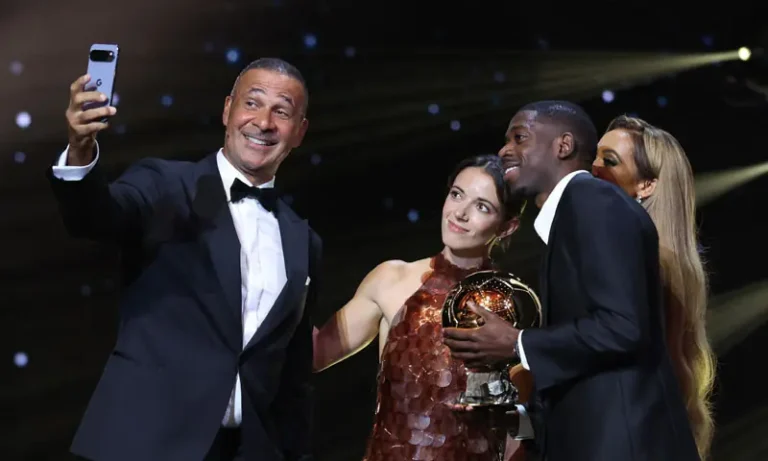Paris Saint-Germain winger Ousmane Dembele lifted the Ballon d’Or on Monday night in Paris, marking the pinnacle of his career after a sensational season that saw him lead PSG to their first-ever Champions League title. On the same evening, Spain’s Aitana Bonmati secured her third consecutive Women’s Ballon d’Or, further cementing her legacy as one of the greatest midfielders of her generation.
Also Check: Muhammad Dwedar Runs for Palestine Amid War and Loss
For Dembele, aged 28, the achievement was both personal and collective. Converted into a centre-forward after Kylian Mbappe’s departure to Real Madrid, he thrived in his new role under Luis Enrique, scoring 35 goals across all competitions. PSG went on to secure a domestic double and capped the season by demolishing Inter Milan 5-0 in Munich to clinch the European Cup. The moment was historic not only for the club but also for Dembele, who succeeded Manchester City’s Rodri as the Ballon d’Or winner. Standing on stage at the Théâtre du Châtelet, he spoke with emotion: “I really don’t have the words. It was an incredible season with PSG. This is an individual trophy, but it was really the collective that won it.”
The French forward’s journey has been one of persistence. From his early years at Rennes and his rise at Borussia Dortmund, to a challenging spell at Barcelona and finally flourishing in Paris, the Ballon d’Or symbolises not just his talent but his resilience. He credited his coach Luis Enrique, who was also named Club Coach of the Year, saying: “He has been like a father to me.” The night was made even more remarkable as nine PSG players were among the nominees, a sign of the club’s dominance in Europe.
Dembele edged out teenage prodigy Lamine Yamal, who still made history by winning the Kopa Trophy for the best under-21 player for the second year running. The 18-year-old continues to be hailed as the future of Spanish football, following in the footsteps of greats who came before him. Meanwhile, Gianluigi Donnarumma, a key figure in PSG’s Champions League-winning campaign before his move to Manchester City, was honoured with the Yashin Trophy as the world’s best goalkeeper.
On the women’s side, Aitana Bonmati once again reigned supreme. Despite enduring a difficult season where Barcelona fell short in the Women’s Champions League final against Arsenal and Spain lost the Women’s Euro 2025 final to England, Bonmati’s brilliance never dimmed. She was named Player of the Tournament at the Euros, an impressive feat considering she only returned after recovering from viral meningitis. The 27-year-old midfielder’s consistency, vision, and leadership earned her the Ballon d’Or for the third year in a row, an achievement only shared by a few in the history of the sport.
In her speech, Bonmati humbly credited her success to the strength of her teams: “I think I am here for the third consecutive time because of the teams I play in, so all of this is because of them.” She beat her Spanish teammate Mariona Caldentey, who shone for Arsenal and Spain, while England’s Alessia Russo finished third following her standout performances in the European Championship.
Bonmati’s dominance follows the earlier successes of her Barcelona teammate Alexia Putellas, making this era one where Spanish football continues to produce icons in the women’s game. Alongside her, Vicky Lopez, a 19-year-old Barcelona and Spain forward, was named Best Young Women’s Player, signalling that the future is just as bright.
The night also recognised other outstanding achievements: Hannah Hampton of England was awarded Best Women’s Goalkeeper after helping her nation win the Euros, and her coach Sarina Wiegman took home the award for Best Women’s Coach.
The Ballon d’Or remains football’s most prestigious individual award, voted on by journalists from the world’s leading football nations. For Dembele, it was the crowning moment of his career, fulfilling the promise he had shown years ago. For Bonmati, it was another reminder that she continues to set the standard for excellence in the women’s game. Together, their triumphs represent not only personal glory but also the evolving stories of PSG, Spain, and the global football landscape.


